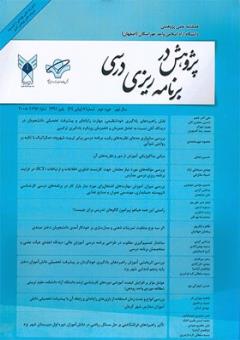Providing a Model for the optimal use of Mobile Phone Social Networks with Emphasis on the Cultural Identity of Students
Subject Areas : Research in Curriculum Planning
1 - Associate Professor, Department of Communication Sciences and Business Management, Faculty of Humanities and Law, Islamic Azad University Isfahan (Khorasgan) Branch, Isfahan, Iran
Keywords: Identity, Cultural identity, Social networks, Mobile phone, Grounded theory,
Abstract :
The present research aimed to investigate the optimal use of mobile phone social networks with an emphasis on the cultural identity of students for providing models. The research was developmental in terms of outcome, exploratory in terms of purpose, and had the field type in terms of strategy. The research methodology had a qualitative type. The statistical population consisted of university professors in culture and media. Theoretical sampling and then the snowball technique was used for conducting interviews. The open, axial, and selective data coding methods were used, and 300 codes were identified in the initial coding stage, then 198 codes were identified in the second stage of open coding, and 37 codes were identified in 5 categories in the axial coding stage (causal, underlying, and intervention conditions, strategy, consequences), and finally, a model was provided in selective coding. The grounded theory and MAXQDA 2018 software were used to analyze data and convert them into usable information in the model. Based on the research findings, it is necessary to create a suitable basis for familiarizing and consolidating the pillars of identity formation among young people, especially students.
Bagheri, K. (2016). A Look at Islamic Education (41 ed.). Tehran: Borhan,44-45.
Bakhshi, B., Khorsan, M., Hoseini dana, H., Dadjoi tavakoli, S. (2014) The consequences study of new communication technologies on the Learning Process. Media Studies, 9(25), 139-150.
Corbin, J., & Strauss, A. (2008). Basics of Qualitative Research: Techniques and Procedures for Developing Grounded Theory (3rd ed.). Thousand Oaks, CA: Sage
Dadgaran, M. (2017). The Basics of Mass Communication (5 ed.). Tehran: Morvarid.
Eltantawi, N. & Wiest, J. B. Social Media in the Egyptian Revolution:Reconsidering ResourceMobilization Theory, International Journal ofCommunication. 2011;(5): 1207–1224
Eslamieh, F., oladian, M., Safari, M. (2019). Conceptual Design of Green Schools in Iran. Journal of School Administration, 7(2), 60-81. Journal of School Administration
Farmahini farahani M, Rahnema A, Rezvankhah S. Vocational Education from A`eme Athar viewpoint. TLR. 2010; 1 (42) :251-270
Gharaee, A. (2018). Sociology of Education. tehran: Abjad.
Gangwani, Sanjeevni; Alruwaili, Norah; Safar, Sarah A L. (2021). SOCIAL MEDIA USAGE AND FEMALE EMPOWERMENT IN SAUDI ARABIA. Academy of Strategic Management Journal; Arden Vol. 20, Iss. 4, (2021): 1-8.
Hashemi,Sh.(2015). Review of Media Role in Educational System of Document on Fundamental Reforms in Education: Emphasis on Necessity of Media Literacy Education. Rasaneh, 25(4), 5-18.
Hosein Zade, A., & Mouhammadi, M. (2010). Media literacy, the necessity of today's world. kolliyat, 45-58.
jafari. (2018). Islamic Education. Tehran: Allameh Jafari.
Katharina Diergarten. Anna, Möckel. Nieding, Gerhild. Ohler, Peter.(2017). The impact of media literacy on children's learning from films and hypermedia. Journal of Applied Developmental Psychology. Pages 33-41.
Kaur, P., Islam, N., Tandon, A., & Dhir, A. (2021). Social media users’ online subjective well-being and fatigue: A network heterogeneity perspective. Technological Forecasting and Social Change, 172, 121039.
livingtone ,Sonia(2010). Media Literacy and the Challenge of New Information and Communication Technologies. Published online. Pages 3-14.
Li, Jianjun; Dai, Yonghui; Shi, Qinghua; Xian, Jin (2020). Study of situation awareness of cultural security based on social media analysis. International Journal of Distributed Sensor Networks, 16(1), 155014772090360–. doi:10.1177/1550147720903604.
Mahdi Zade, M. (2017). Media Theories (6 ed.). Tehran: Hamshahri.
Mehrani, E. (2018). Media or other parents (13 ed.). Isfahan: Fahm.
Mo'tamed Nejad, K. (2012). Mass Communication. Tehran: Allameh Tabatabaei University.
Norouzi, M., kazemi, A., Shahmoradi, S. (2017). Strategies for Religious Training in Cyberspace with an Emphasis on the Quranic Teachings and Imam Reza’s Traditions. Journal of Razavi Culture, 5(19), 177-211.
Rahman zadeh, S. (2010). Functions of Virtual Social Network In Globalization Period. Strategic Studies of public policy, 1(1), 49-78
Saeid, z., & Farahani, M. (2012). The effect of media on education and development of children and adolescents. Promotional training, 39-62.
Sarmadi, M. (2015). The Educational Role of the Media in Contemporary Education Based on the Postmodernist Philosophical Perspective. 11th Iranian E-Learning Conference (p. 35). Tehran: School of Distance Education.
Sarokhani, B. (2016). Sociology of Communication (31 ed.). Tehran: Ettelaat.
Shahjafari, T., Ebrahimabadi, H., Rezaei, M., Ebrahimzadeh, I. (2015). Pattern of Internet Usage in Planning after-School Programs. Interdisciplinary Studies in Humanities, 7(2), 127-147. doi: 10.7508/isih.2015.26.006
Simpkins, S. D., Davis-Kean, P. E., & Eccles, J. S. (2006). Mathand science motivation: A longitudinal examination of the links between choices and belief. Developmental Psychology, 42, 70-83
Sobhanejad Mehdi, Afshar Abdollah, Rezai Zarchi Reza. The Pathology of Religious Education in the Age of Globalization and its Dynamic Interaction Strategies. Teaching and learning research. 2010; 1 (42): 271-292
Taghizadeh, A. (2018). The Effectiveness of Training Media Literacy on Students in Kerman. Communication Research, 24(92), 153-174.
Tavosi, R. (2016). The status of media literacy in the educational system. First National Conference on planning and development of the educational system (p. 10). Qom: Payam Noor university.
The Internet and Virtual Socialization of Adolescent Students A Case Study of High School Students in Sari, Mazandaran, Iran)). scds. 2017; 5 (4) :9-41
The Internet and Virtual Socialization of Adolescent Students A Case Study of High School Students in Sari, Mazandaran, Iran)). scds. 2017; 5 (4) :9-41

